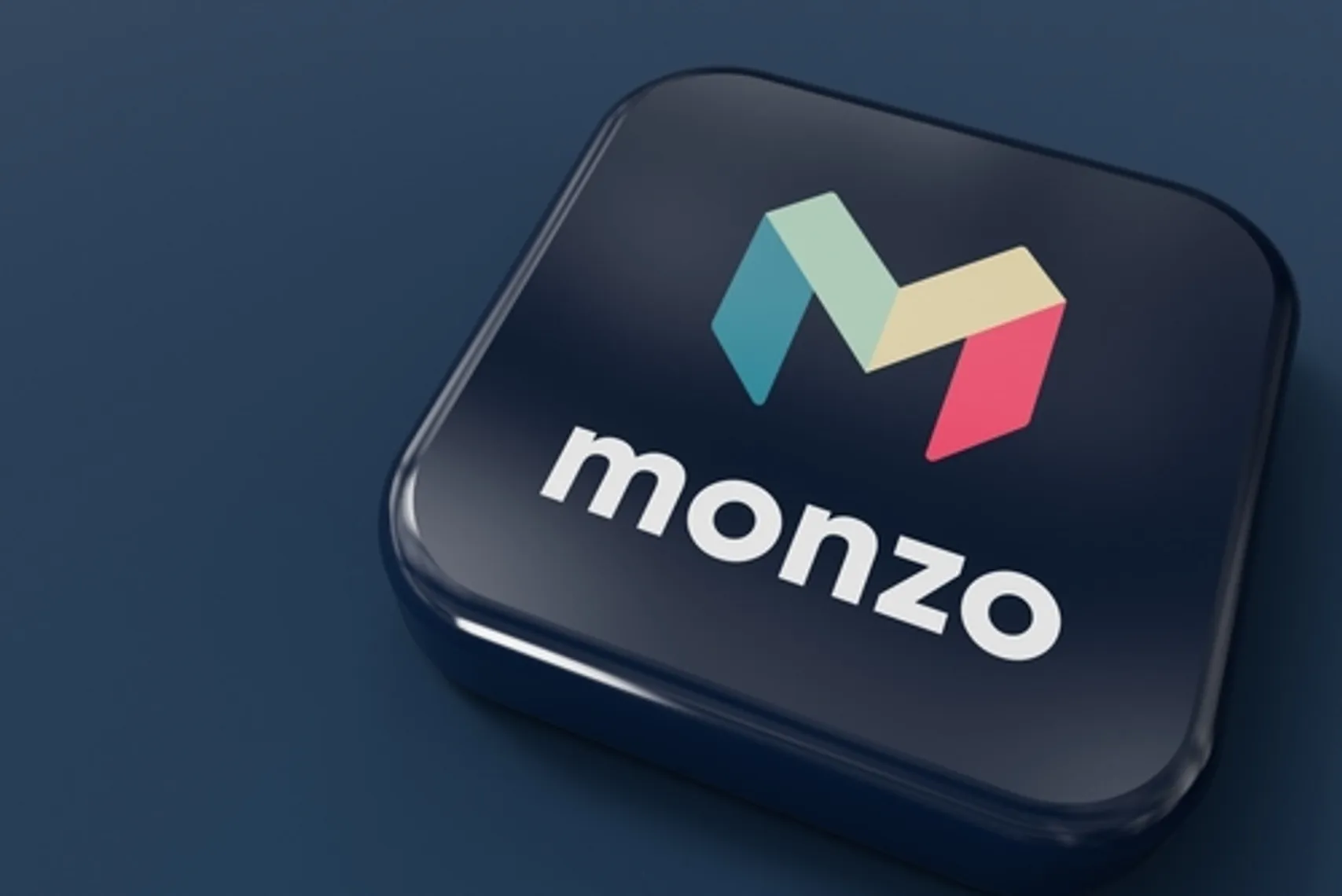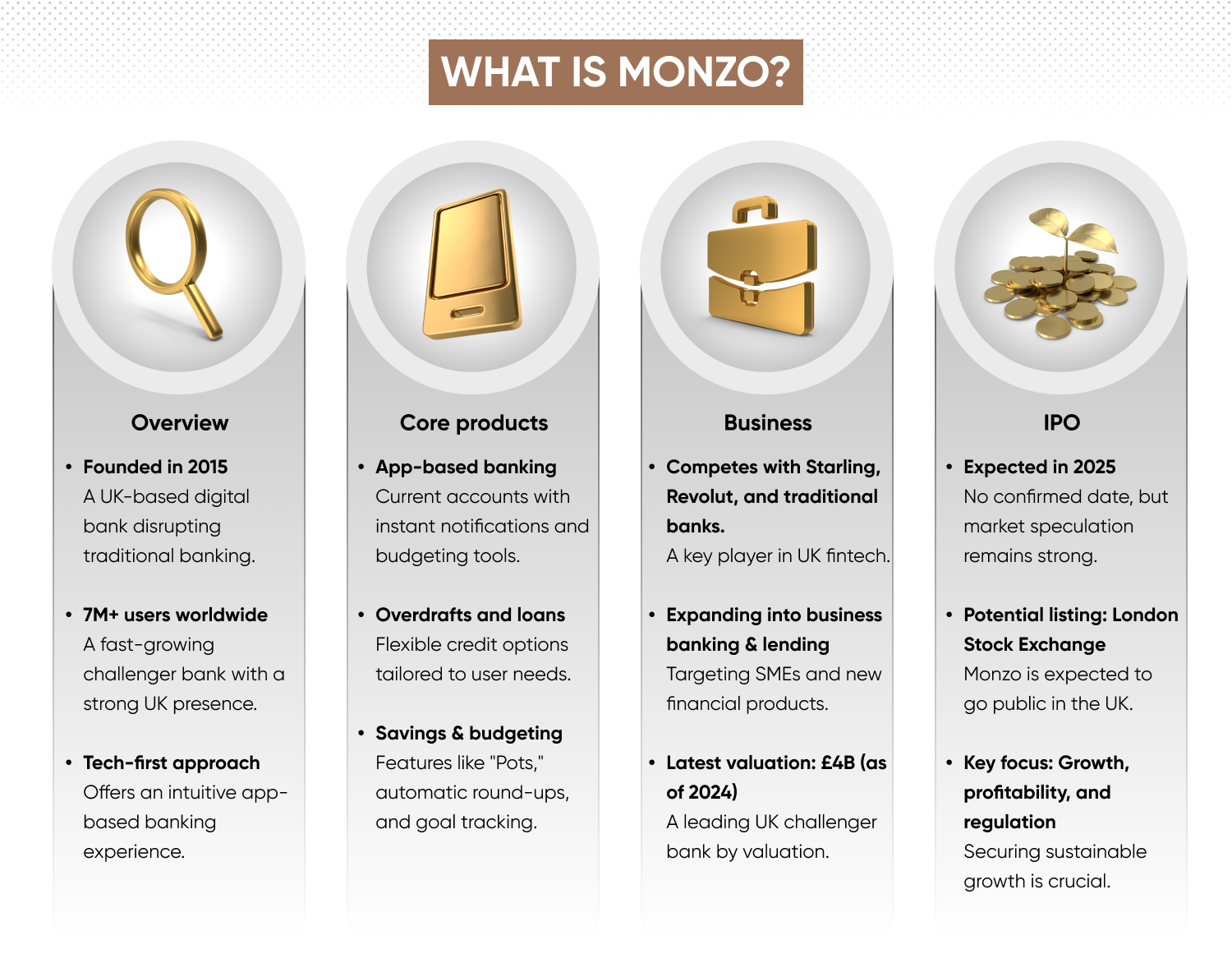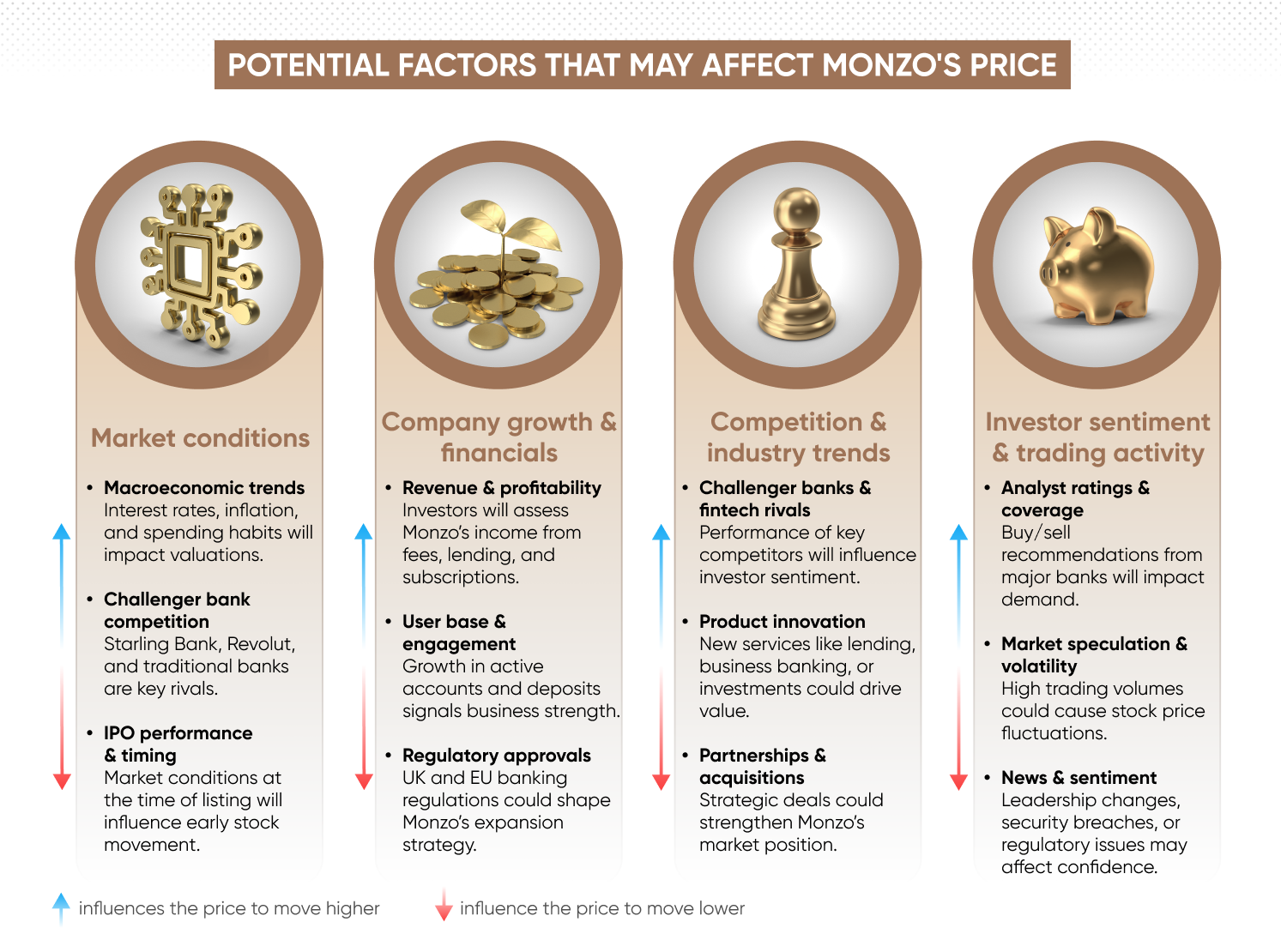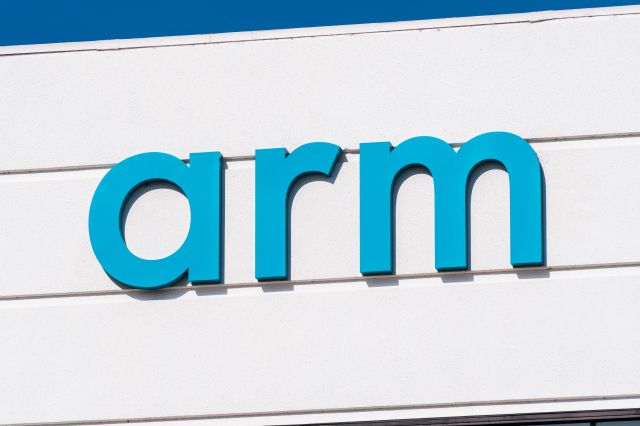Monzo IPO – how to trade Monzo shares

When is the Monzo IPO date?
As of February 2025, Monzo has not officially announced a specific date for its initial public offering (IPO). However, reports suggest that the company is considering a future IPO as it continues to expand in the UK and internationally. With its strong user base and digital-first approach, a public listing could provide additional capital for growth.
Monzo aims to be ‘IPO ready’ by the end of 2025, though the actual listing may not occur until 2026. The company is focusing on strengthening its governance and completing necessary groundwork to ensure a successful public debut.
Valuation
In its latest funding round in 2024, Monzo was valued at approximately £4.5 billion. The company reported its first annual profit last year, driven by higher interest rates and increased transaction and subscription fees.
Potential IPO locations
There is an ongoing debate within Monzo regarding the preferred location for its IPO. CEO TS Anil is advocating for a US listing, aiming to tap into deeper capital markets and higher valuations often seen for tech-focused companies across the Atlantic. Conversely, Monzo's board leans towards a UK listing, aligning with the company's substantial domestic customer base exceeding 10 million.
Market context
The decision on where to list comes at a pivotal time for the UK equity markets, which have experienced a downturn in IPO activity. Companies floating in London raised the least money on record last year, leading to concerns about the market's liquidity and valuations. A Monzo listing could significantly rejuvenate the UK's equity markets, particularly in the fintech sector, which is viewed as a potential growth engine.
Overall, while Monzo has not set a specific IPO date, the company is actively preparing for a public listing, with considerations ongoing regarding the optimal timing and location to best support its growth and shareholder value.
What is Monzo?

Monzo is a UK-based digital bank that offers app-based financial services, including current accounts, savings features, and budgeting tools. Founded in 2015, it has grown into one of the leading challenger banks, disrupting traditional banking with a customer-first, tech-driven approach.
Key features of Monzo
-
App-based banking: a mobile-first current account with instant notifications and real-time spending insights.
-
Savings and budgeting tools: offers ‘Pots’ for savings, automatic round-ups, and spending controls.
-
Fee-free spending abroad: provides low-cost forex transactions and ATM withdrawals.
-
Overdrafts and loans: offers flexible credit options, including overdrafts and personal loans.
-
Monzo Premium and Plus: subscription-based accounts with additional perks like travel insurance and virtual cards.
Monzo is regulated in the UK as a fully licensed bank, providing users with financial security and FSCS protection on eligible deposits.
Monzo valuation history
Monzo’s valuation has seen significant growth over the years, reflecting its rapid user expansion, product diversification, and investor confidence in the digital banking sector. However, market conditions and profitability concerns could impact its future IPO valuation.
|
Year |
Funding round |
Estimated valuation |
Key developments |
|
2017 |
Series C |
£280m |
Gained UK banking licence, transitioned from prepaid cards to full current accounts. |
|
2018 |
Series D |
£1bn |
Reached 1m customers, expanded lending services. |
|
2020 |
Series G |
£1.25bn |
COVID-19 impact led to a valuation cut, but user growth continued. |
|
2021 |
Private funding |
£3.5bn |
Rebounded with increased revenue from lending and premium accounts. |
|
2024 |
Pre-IPO funding |
£4.5bn |
Expanded business banking, international presence, and premium offerings. |
|
TBD |
Potential IPO |
? |
Valuation will depend on market conditions, revenue growth, and profitability prospects. |
How does Monzo make money?
Monzo makes money as a fully digital bank, offering financial services primarily through its mobile app. Unlike traditional banks, it doesn’t rely on physical branches but instead provides a seamless, tech-driven experience.
Monzo’s revenue comes from multiple sources, which can be broken down as follows:
|
Revenue stream |
Description |
|
Interchange fees |
A small percentage earned when customers use their Monzo cards. |
|
Overdrafts and loans |
Interest earned from offering credit services. |
|
Subscription plans |
Monzo Plus and Monzo Premium offer additional features for a fee. |
|
Marketplace partnerships |
Earnings from third-party financial products like insurance. |
|
Business banking |
Revenue from Monzo Business accounts designed for SMEs. |
|
Financial metric |
Performance trend |
|
Revenue growth |
In the financial year ending March 2024, revenues surged by 147% to £800 million, up from £355.6 million in the previous year. |
|
Profitability |
Achieved a pre-tax profit of £15.4 million in the financial year ending March 2024, marking the company's first full year of profitability. |
|
User base |
Reached 9.7 million customers by May 2023, making it the seventh-largest bank in the UK by customer numbers. |
|
Customer deposits |
Saw an 88% increase in customer deposits, totaling £11.2 billion in the financial year ending March 2024. |
What might influence the Monzo live stock price?
Monzo’s stock price, once publicly traded, will be influenced by multiple factors, from broader market conditions to company performance. Investors will monitor growth, profitability, and regulatory changes closely.
Market conditions and industry trends
Macroeconomic trends: interest rates, inflation, and consumer spending habits will impact fintech valuations. Higher interest rates can boost Monzo’s lending revenue but may also dampen demand for borrowing, while economic downturns could impact transaction volumes.
Challenger bank competition: Monzo operates in a crowded space, competing with other digital-first banks like Starling Bank and Revolut, as well as legacy financial institutions expanding their own digital offerings. Any shifts in market share or product differentiation will influence investor confidence.
IPO performance: the initial trading days post-IPO can set the tone for the stock’s movement. A strong debut could create upward momentum, while a lukewarm reception might lead to early volatility and selling pressure.
Company fundamentals and growth
Revenue and profitability: investors will scrutinise Monzo’s ability to generate sustainable profits, particularly from key revenue streams such as premium subscriptions, lending, interchange fees, and business accounts. As Monzo recently turned profitable, continued earnings growth will be a critical factor.
User growth and engagement: a rising customer base and increased account usage (eg, deposits, transactions, loans, and savings) will signal strong demand for Monzo’s services. High engagement levels, particularly among premium users, could support a higher valuation.
Regulatory status: as a regulated UK bank, Monzo must comply with strict financial oversight. Any regulatory challenges, fines, or policy changes – such as stricter capital requirements – could impact business flexibility and profitability. Expansion into new markets, particularly the US, also brings regulatory complexities.
Market sentiment and trading activity
Analyst ratings: reports from investment banks and financial analysts will guide investor sentiment. Bullish ratings could drive demand, while downgrades or concerns about long-term profitability might trigger sell-offs.
News and public perception: security breaches, product innovations, partnerships, or executive leadership changes can sway investor sentiment. Monzo has a strong community-driven brand, so maintaining trust will be essential.
Short interest and trading volume: as a fintech stock, Monzo may experience higher volatility, especially in the early months post-IPO. High trading volume could lead to rapid price swings, with short-sellers also influencing daily price action.

How to trade Monzo stocks
As and when Monzo debuts on the stock market, follow these steps to trade shares:
-
Choose a brokerage platform: select a regulated broker offering Monzo shares or CFDs. Learn more about contracts for difference in our CFDs trading guide.
-
Set up a trading account: register and verify your identity.
-
Deposit funds: add money to your account using your preferred method.
-
Monitor stock performance: stay updated on financial reports and industry news.
-
Place a trade: buy or sell shares using market or limit orders. Consider stop-loss orders for risk management.
You can keep your finger on the pulse of the markets with expert insight from our in-house analysts. Check out our news and analysis section for more.
Looking into trading fintech stocks? Learn more about eToro's upcoming IPO.
Which fintech stocks can I trade?
While Monzo hasn’t confirmed its IPO date, investors can still gain exposure to the fintech sector by trading other major players.
-
Wise (WISE.L): specialises in international money transfers and borderless banking.
-
Adyen (ADYEN.AS): a global payments processor serving companies like Netflix and Uber.
-
SoFi Technologies (SOFI): a US-based online bank offering personal finance and trading services.
-
Nubank (NU): a leading digital bank in Latin America.
-
FIS (FIS) and Fiserv (FI): provide financial technology infrastructure for banking and payments.
Learn more about trading shares on fintech stocks and other shares with our comprehensive shares trading guide.
FAQ
Who owns Monzo?
Monzo is privately owned, with shares held by its founders, employees, and venture capital firms like Accel, General Catalyst, and Passion Capital. Once it goes public, ownership will expand to public investors.
How much is Monzo worth?
Monzo’s latest valuation in 2024 was around £4.5 billion following its most recent funding round. This figure could change ahead of a potential IPO.
When will Monzo IPO?
There is no confirmed Monzo IPO date, but analysts speculate it could happen in 2025 or later.
How do I invest in Monzo before its IPO?
Pre-IPO investment is usually limited to venture capital and private equity firms. Some secondary marketplaces may offer pre-IPO shares, but most retail investors will need to wait until the official listing.
Will Monzo shares be available for CFD trading?
If Monzo goes public, many brokers may offer CFDs on Monzo stock, allowing traders to speculate on price movements without owning the shares. Availability will depend on the broker and market conditions.
Explore our IPO guides
Stay informed on upcoming or recent IPOs, market trends, and the newest trading opportunities

Arm IPO
